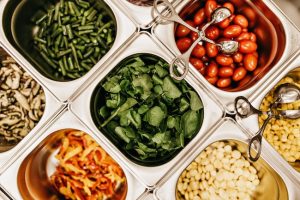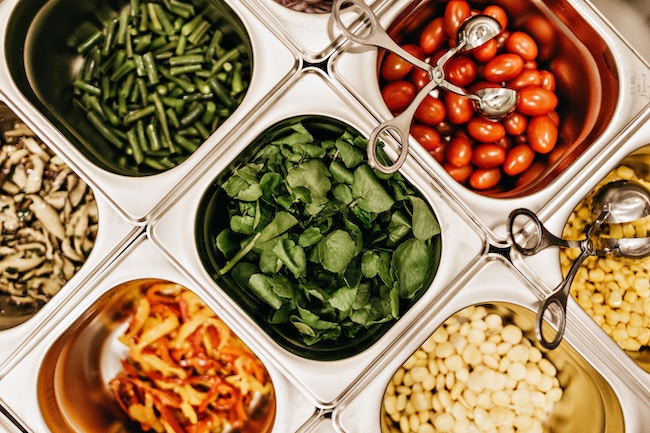
The berachah rishonah for many of the foods listed below is problematic, so we have attempted to present a clear decision for each one based on the views of the majority of the contemporary poskim. Many, but not all, of the decisions follow the rulings of the venerable halachic authority, Harav S.Z. Auerbach z”l.
Many facts must be ascertained before determining the correct berachah rishonah for a given food: What is the nature of the plant or tree from which it is derived? What is the exact make-up of each of its components? What manufacturing processes were used? Based on all of the data available, the poskim have rendered the following decisions(1):
LIST OF FOODS
Apple kugel: Mezonos. [In the unusual case that the flour is added just to “bind” the apple mixture but not to enhance its taste, ha-eitz is recited.]
Applesauce: Commercially produced applesauce in which the apples are reduced to a nearly liquid state – shehakol. Home made applesauce which is usually lumpy and contains small pieces of the apple – ha-eitz.(2)
Blackberry: Ha-eitz. It grows on a tree which stays alive throughout the winter months and reaches a height of well over ten inches.(3)
Blueberry: Ha-eitz. See Blackberry.
Breadsticks: When eaten as a snack – mezonos.(4) When many breadsticks are eaten at one sitting, or when eaten as part of a meal, netilas yadayim and ha-motzi may be required.(5)
Challah kugel: Mezonos.(6) If the individual pieces of challah are bigger than a k’zayis (approximately 1 oz.), netilas yadayim and ha-motzi are required.(7)
Cheesecake: Mezonos. If the dough is meant to merely hold the cheese filling together, only shehakol is recited.
Chocolate-covered nut or raisin: This is a “combination food,” generally eaten because the two items complement each other’s taste. According to some poskim, both shehakol and ha-eitz(8) are recited.(9) [Individuals who regard either the chocolate or the raisin as merely an “enhancer” to the “main” food, should recite the blessing on the main food.] Other poskim maintain that only the blessing over the majority ingredient is recited.(10) Still other poskim suggest that only ha-eitz should be said. (11)
Chocolate-covered orange peels: Shehakol.(12)
Corn chips: Shehakol. Corn chips are produced from corn meal.
Cranberry: Ha-adamah.(13) Cranberries grow on a bush which does not reach a height of ten inches.
Felafel balls: Shehakol.(14)
Fried fish (or schnitzel): If the fish is dipped in a thin coating of flour – shehakol. If it is dipped in a thick coating [e.g. fish sticks] – mezonos.(15)
Fruit cocktail(16): Recite the blessing over the fruit that constitutes the majority of the mixture.(17)
Fruit salad (large chunks of fruit): Separate blessings of ha-eitz and ha- adamah are required.
Halvah: Shehakol.(18)
Ice cream cone: If the cone serves as a cup to hold the ice cream, only a shehakol over the ice cream is required. If the cone is eaten for its own taste (e.g., a sugar cone), a mezonos is recited over the cone and a shehakol over the ice cream.(19)
Licorice: Shehakol.(20)
Mashed potatoes: Ha-adamah. Instant mashed potatoes are also ha-adamah.(21)
Matzah brei: When deep-fried – mezonos. If it was pan-fried, it should be eaten only during a meal when ha-motzi is made over bread.(22)
Meatballs (small) and spaghetti: When eaten together in one spoonful – mezonos.
Onion rings: Mezonos. Generally fried in batter made from grain flour.(23) If it was fried without flour – ha-adamah.
Papaya: Ha-adamah.(24)
Peanut butter (crunchy or plain): When eaten alone – shehakol.(25) When spread on bread or a cracker, no blessing is recited over the peanut butter.
Popcorn: Ha-adamah.(26)
Potato chips: Ha-adamah.(27)
Potato kugel or latke: Ha-adamah. If the potatoes are blended into a liquid state and are no longer recognizable as potatoes, several poskim maintain that a shehakol is recited.(28)
Pringles: Ha-adamah.(29) Some poskim maintain that a shehakol is recited. (30)
Raspberry: The poskim debate whether its blessing is ha-eitz(31) or ha- adamah.(32) Because of the doubt, ha-adamah is preferable.(33)
Rhubarb: Ha-adamah.(34)
Rice cakes: Most contemporary poskim agree that the correct blessing is ha- adamah,(35) while a minority tends to rule that the correct blessing is mezonos.(36)
Tomato juice: Shehakol.(37)
Sabra: Ha-eitz.(38)
Strawberry: Ha-adamah.(39)
Stuffed cabbage: The cabbage, meat and rice are usually eaten together in one spoonful. Only one blessing is recited – over the majority ingredient. (40)
Vegetable salad with croutons: Mezonos and ha-adamah are required, even though the croutons are merely “enhancers” for the salad.(41) It is preferable to have another mezonos food item available and recite the blessing over it.
FOOTNOTES:
1 We have previously dealt with the proper berachos for breakfast cereals; see The Weekly Halachah Discussion, pgs. 159-169.
2 Based on Mishnah Berurah 202:40 and 42 and Minchas Shelomo 1:91-3. One who recites ha-eitz on all kinds of applesauce has valid sources upon which to rely; see Yabia Omer 7:29 and Pischei Halachah, pgs. 170-171.
3 Igros Moshe O.C. 1:85; Vesein Berachah, pg. 396; Vezos ha-Berachah, pg. 372. Wild blackberries or blueberries, which grow on bushes that do not reach a height of ten inches, require a ha-adamah. But often, these berries are infested with worms and require careful inspection. Commercially sold berries are grown on trees, not on low bushes.
4 Harav S.Z. Auerbach (Vesein Berachah, pg. 468 and Vezos ha-Berachah, pg. 21). Same rule applies to melba toast, bagel chips and pita chips; ibid.
5 See details in The Weekly Halachah Discussion, pgs. 479-481.
6 Harav S.Z. Auerbach (Vesein Berachah, pg. 474).
7 See Vezos ha-Berachah, pg. 27.
8 First the shehakol on a bit of chocolate, with specific intention not to exempt the fruit, then the ha-eitz over the fruit.
9 Igros Moshe O.C. 3:31.
10 Harav S.Z. Auerbach (quoted in Vesein Berachah, pg. 417); Harav Y.S. Elyashiv (quoted in Vezos ha-Berachah, pg. 97). When in doubt which ingredient is the majority, recite a shehakol; ibid.
11 Mekor ha-Berachah 22.
12 Mishnah Berurah 202:39.
13 Harav S.Z. Auerbach (quoted in Vesein Berachah, pg. 394).
14 Yabia Omer 7:29 (addendum); Vezos ha-Berachah, pgs. 249 and 369.
15 Consensus of several contemporary poskim, quoted in Vezos ha-Berachah, pg. 110. See Pischei Halachah, pgs. 234-238, and Yalkut Yosef 13:1 for dissenting opinions.
16 Or a fruit salad in which the fruit is cut up into small pieces and eaten together in one spoonful.
17 Mishnah Berurah 212:1. Different kinds of ha-eitz fruits (e.g., apples and oranges) combine to form a majority of ha-eitz, and vice versa (Vezos ha-Berachah, pg. 94, quoting Harav S.Z. Auerbach and Harav Y.S. Elyashiv).
18 Harav S.Z. Auerbach (quoted in Vesein Berachah, pg. 415).
19 Igros Moshe O.C. 4:43; Vezos ha-Berachah, pg. 234.
20 Vezos ha-Berachah, pgs. 110 and 251; Pischei Halachah, pg. 276.
21 Harav S.Z. Auerbach and Harav Y.S. Elyashiv (quoted in Vesein Berachah, pg. 407). Vezos ha-Berachah, pg. 239, however, questions this ruling.
22 Harav S.Z. Auerbach (quoted in Vesein Berachah, pg. 475).
23 Pischei Halachah, pg. 163; Vesein Berachah, pg. 79.
24 Harav Y.S. Elyashiv (quoted in Vezos ha-Berachah, pg. 375, note 66); Yechaveh Da’as 4:52; Vesein Berachah, pgs. 395 and 422; Pischei Halachah, pg. 155.
25 Harav S.Z. Auerbach and Harav Y.S. Elyashiv (quoted in Vesein Berachah, pg. 410, and in Vezos ha-Berachah, pg. 372, note 10).
26 Vezos ha-Berachah, pg. 102, quoting several poskim.
27 Igros Moshe Y.D. 4:48-5.
28 See Vesein Berachah, pg. 407 and Vezos ha-Berachah, pg. 239.
29 Harav S.Z. Auerbach (quoted in Vesein Berachah, pg. 407); Harav Y.S. Elyashiv (quoted in Vezos ha-Berachah, pg. 239).
30 Vezos ha-Berachah, pg. 365.
31 Mishnah Berurah 303:1; Aruch ha-Shulchan 303:5; Pischei Halachah, pg. 154.
32 Taz 304:8; Ketzos ha-Shulchan 49:6.
33 Harav S.Z. Auerbach and Harav Y.S. Elyashiv (quoted in Vesein Berachah, pg. 396).
34 Vesein Berachah, pg. 396; Vezos ha-Berachah, pg. 370.
35 Ohr l’Tziyon 14:21; Harav S.Z. Auerbach, Harav C.P. Scheinberg, Harav M. Shternbuch, quoted in Vezos ha-Berachah, pg. 108 and in Vesein Berachah, pg. 520).
36 Harav Y.S. Elyashiv, ibid.; Pischei Halachah, pg. 286.
37 Harav S.Z. Auerbach (Vesein Berachah, pg. 429); Harav Y.S. Elyashiv (Vezos ha-Berachah, pg. 374, note 45).
38 Yechaveh Da’as 2:21.
39 Igros Moshe O.C. 1:86.
40 Vesein Berachah, pg. 68; Pischei Halachah, pg. 108; Vezos ha-Berachah, pg. 366. The same rule applies to a goulash made from meat and vegetables.
41 Based on Mishnah Berurah 212:5; Vesein Berachah, pg. 60.
Weekly-Halacha, Text Copyright © 2007 by Rabbi Neustadt, Dr. Jeffrey Gross and Torah.org. Weekly sponsorships are available–please send email to the moderator, Dr. Jeffrey Gross [email protected].
Rabbi Neustadt is Rav of Young Israel in Cleveland Heights. He may be reached at 216-321-4635 or at [email protected].


